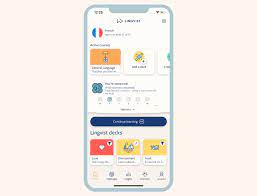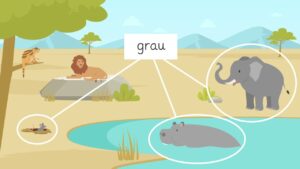Pretty German Words
German Gemütlichkeit
The German language sounds harsh to many and appears too complex. Few people consider this language melodic before they dive deeper into German culture. Mark Twain even said German should be listed among the dead languages because only the dead would have enough time to learn it. While foreigners might hold such unfair beliefs, every native German speaker can name a bunch of beautiful German words and provide a sufficient explanation of the uniqueness of their language.
The German language indeed boasts quite a few concepts that do not exist in other languages and allows native speakers to express great ideas. One of them is Gemütlichkeit. While English speakers translate it as coziness, this term does not convey the depth of the German word. Gemütlichkeit extends beyond the comfort of the physical world and includes a complex inner feeling one experiences in a certain ambiance:
Example #1

Was ist dein Lieblingswort? 00:18 - 00:21
This lesson is devoted to beautiful German words you won’t find in another language. Our German instructor Birgit and her American student Alex will use their entertaining dialogue format to unveil the beauty of the German language.
FAQ: What is the most beautiful German word?
Gemütlichkeit was named the prettiest German word of 2019. Representatives of 46 countries participated in voting and picked this one as the most unique and beautiful noun. It was followed by der Schmetterling (the butterfly).
Pig, Dogs, and Pea Counters
- La-la-la, Du bist mein Tattoo, deine Worte gehen unter die Haut, la-la-la. Du tust mir nich gut…
- Wow, Birgit! A beautiful voice. Are we having a music lesson today?
- Sorry, Alex, didn't see you there. Ich habe einfach einen Ohrwurm. Ich bekomme diesen Song nicht aus dem Kopf.
- Ah, an "earworm".
- Exactly. By the way, today’s topic is pretty and funny German words. What do you think about that?
- Well, I don’t believe they exist, they're an urban legend, like a functioning ice cream machine at McDonald's. But the topic seems more intriguing than possessive pronouns or the subjunctive mood, I'll give you that.
- Yeah, I’d say this one is just as interesting as German pick-up lines.
- Hold your horses, Birgit. What I think is that German pretty words are just as lame as German Anmachssprüche.
- I’ll prove you wrong. Here’s a list of unique German compounds built around an animal or a plant: Ohrwurm, Innerer Schweinehund, Honigkuchenpferd, Purzelbaum, Erbsenzähler. Can you guess their meanings?
- P-U-R-Z-E-L-B-A-U-M. This gives me a tingling sensation, like a purring cat. I have no idea what it means though...
- Check this video for the answer:
Example #2

- Ah, a somersault! I'm bad at this, even worse than in German.
- Is that even possible?
- Yeah, hard to imagine, Frau Uplifting.
- Purzelbaum is a tumble tree. Small children like it as it involves getting muddy.
- Kids? I’d love to do the Purzelbaum.
- I'm sure you would, Alex. If you have no further suggestions, here’s what the other beautiful words mean:
Table #1 – Pretty animal/plant-based words
- Alex, du strahlst schon wie ein Honigkuchenpferd. By the way, you could translate it as, "You're smiling like a Cheshire cat". Are any of these funny enough for your palate?
| Word in German | Literal translation | Meaning |
|---|---|---|
| Ohrwurm, der | earworm | the nagging feeling of having a song stuck in your head and playing on repeat in there |
| Innerer Schweinehund, der | inner pig dog | the voice in your head that is constantly instructing you to put work off and procrastinate |
| Honigkuchenpferd, der | honey cake horse | a very happy and positive person |
| Purzelbaum, der | tumble tree | a somersault in the mud to get dirty and have fun |
| Erbsenzähler, der | peas counter | a person who is too pedantic, even by German standards |
- Sure, they all are, even Honigkuchenpferd. I was just thinking, du bist so eine Erbsenzählerin, Birgit. Und wegen meines inneren Schweinhundes lerne ich ziemlich wenig.
FAQ: What is the angriest sounding German word?
Although many learners say all German words sound rude, German speakers claim Quatsch! is a very harsh sounding term that signifies one is furious (wütend). It could be translated as "nonsense" and is not classified as a swear word. Even children can use Quatsch! when they are angry.
Eggs and Pickles
- Let’s move on to funny German words related to foods.
- Hold on, I know one – dreikäsehoch. I love calling my sister that.
- Heh, right. This term is really funny. What about Weichei? Does it ring a bell?
- Well, I ordered that in a hotel in Berlin once. You don’t mean it literally here, I assume.
- You bet I don’t. Weichei refers to a cowardly person. We also use Würstchen for this.
- Great! Seems like I can go with any German food item to call people names.
- Drinks too! A Schnappsidee, for instance.
- A "schnapps idea"... this sounds like a stupid idea I might have when I drank a bit too much.
- You got this one spot-on.
- So, Germans only use foods to trash-talk others…
- Not quite. We also have neutral terms in this basket. My favorite is Sitzfleisch.
- "Seat meat?" Is that telling a girl she has a large... rear? What an unmanly behavior.
- Only metaphorically. We can describe kids this way, implying they don’t have a cushion under their buttocks that would help them stay put: Kleine Kinder haben kein Sitzfleisch, um lange sitzen zu bleiben. Check the table below, by the way.
- Here we go, Frau Tables has arrived.
Table #2 – Pretty food-based words
| Word in German | Literal translation | Meaning |
|---|---|---|
| Weichei, das | soft egg | a cowardly or weak person |
| Sitzfleisch, das | seat meat | the ability to endure any hardship |
| Dreikäsehoch, adj | three cheeses high | very short, little (to describe a person’s height) |
| Sauregurkenzeit, die | pickle time | a typical German holiday period, off-season in July-August when everyone is on vacation |
| Schnappsidee, die | booze idea | an inherently stupid idea |
- I giggled a little. Oh, a new word – Sauregurkenzeit. Sounds like a time when all German grannies are doing the canning for winter.
- You’re right, partly at least. The focus isn't canning, though. It’s the summer months of July and August when everyone in Germany takes a vacation and leaves the office. Cucumbers are getting ripe around the same time, hence this fantastic compound.
- S-a-u-r-e-g-u-r-k-e-n-z-e-i-t. Wow, I think I just sprained my tongue.
FAQ: What are some fun German words?
Some words foreigners find fun in German are:
- Erklärungsnot (explanation poverty - you can't find a feasible explanation or excuse)
- Schattenparker (shadow parker - a man who behaves like a non-man).
- Schnapsidee (schnaps idea - foolish and unrealistic ideas, as if you were on booze)
- Kopfkino (head cinema - mentally playing a scene in your head)
- Kuddelmuddel (muddled mess - a very messy scene)
Fingertips and Nose Bicycle
- By the way, how do you say "tongue twister", Birgit?
- Zungenbrecher. While Americans "twist" their tongues to pronounce something complex in your language, we straight-up "break" ours.
- Oh, that's intense. You do so with many German words for sure, though. Every other word, I'd say.
- Yeah, learning German is a nice tongue workout. The next German word is a real Zungenbrecher, Alex. It’s Backpfeifengesicht.
- Back-pfeifen-gesicht, something face related. A "slap in the face"? At least that’s what I feel hearing it.
- That's a bingo!
- We just say "bingo".
- I know, but thanks for helping me make a Tarantino reference.
Table #3 – Pretty body-based words
| Word in German | Literal translation | Meaning |
|---|---|---|
| Backpfeifengesicht, das | cheek whistle face | a slap face; one who looks like they need to be slapped |
| Zungenbrecher, der | tongue breaker | a tongue twister |
| Fingerspitzengefühl, das | fingertips feeling | an empathic ability to feel the situation and respond appropriately |
| Nasenfahrrad, das | nose bicycle | eyeglasses |
- There’s another fun term – Nasenfahrrad. It takes after how the item looks.
- Glasses, right?
- I told you, learning German is as easy as it's logical.
- Yeah, another word I love is Handshuhe for gloves. Why come up with new names when you can recycle the old ones. "Boots" for "gloves" sounds just about right.
- Heh, true. Last but not least, here comes an untranslatable term that I love – Fingerspitzengefühl:
Example #3

Das heißt das Wort Fingerspitzengefühl benötigen wir immer dann, oder verwenden wir immer dann, wenn wir viel Gefühl brauchen. 0:20 - 0:30
FAQ: Is German a sweet language?
German certainly doesn't have a reputation as romantic. Despite all the stereotypes, you can say "I love you" and give your beloved one cute pet names in all languages. Don't "Ich stehe auf dich" (I'm into you) and "Ich mag dich" (I like you) sound sweet? What about calling your partner Schätzchen (treasure) or Kuschelbär (teddy bear)?
World and Distance Pains
- Here are five interesting words that I call illness based as they refer to conditions and mental states. Could you check the table, Alex?
- I assume I don't have a choice.
Table #4 – Pretty illness-based words
| Word in German | Literal translation | Meaning |
|---|---|---|
| Lebensmüde, adj | life tired | weary and bored to the point one is ready to engage in stupid, even life-threatening actions |
| Fernweh, das | distance pain | phantom pain and nostalgia projected towards a known or unknown distant place; a strong desire to be somewhere else |
| Sehnsucht, die | painful whim | a yearning for something uncertain |
| Weltschmerz, der | world pain | world weariness; the feeling of melancholy or sadness |
| Torschlusspanik, die | closing-gate panic | a feeling that time is slipping away and one is not in control |
| Kummerspeck, der | grief bacon | excess weight gained as a result of emotional overeating or due to stress |
- Oh, the last one. I have that German friend, Angi. Die Trennung mit ihrem Freund hat sie zum Kummerspeck geführt.
- Yeah, a Bridget Jones scenario.
- And Lebensmüde passt sehr gut zu mir. Just kidding. I’m a reasonable young fella. Fernweh would probably be my choice. Packing my backpack and going where the world takes me, no Google maps. Daydreaming.
- I'd gladly join you.
- I love how unique Sehnsucht and Weltschmerz are, but they project too much pain and negativity.
- Same as Torschlusspanik. That’s my constant state of mind.
- Yeah, the feeling that German's slipping away from me...
FAQ: How do you use fernweh?
This unique German term is the opposite of "homesickness". It consists of two parts - "fern"(far away) and "Wehe" (pain), Fernweh is a romantic noun that signifies an urge or craving to visit yet unvisited places and to see the yet unseen. Many foreigners find this abstract concept very strange yet relatable.
From Damage Joy to Spanish Shame
- Oh, there’s also that crazy concept of feeling happy for someone’s misery, which is awesome.
- You mean Schadenfreude. This man explains it nicely:
Example #4

- Or being ashamed for someone else, Fremdschämen.
- I guess my friends experience that a lot. It's called second-hand embarrassment.
- A nice joke, Alex. Great that it popped up in your head now, not after the class. Otherwise, it would have been Treppenwitz or staircase joke.
- Where do you get all these complex concepts in your language? And the weird part is that I can relate to all of them!
- There's more in the table below, actually.
Table #5 – Pretty feeling-based words
| Word in German | Literal translation | Meaning |
|---|---|---|
| Schadenfreude, die | damage joy | the feeling of happiness caused by another person’s sadness |
| Fremdschämen, das | exterior shame | feeling shame for someone else |
| Treppenwitz, der | staircase joke | a joke you come up with after you’ve finished talking to a neighbor |
| Wanderlust, die | travel desire | itchy feet; a passion for traveling |
| Geborgenheit, die | safety feeling | the feeling of being in the moment and feeling the moment intensely |
| Zweisamkeit, die | being two | the opposite of loneliness; the state of being a couple |
- Zweisamkeit. This one is great.
- It’s my favorite – the state of togetherness.
FAQ: What is Waldeinsamkeit?
"Wald" (forest) + "einsam" (alone) + -keit suffix yields a unique German concept - "Waldeinsamkeit". One can roughly translate it as feeling good when being alone in the woods, finding solace and energy in the forest without anyone around.
Are You Convinced German Is Beautiful?
Do these pretty words make German more appealing to you? As complex as language learning may seem at first, it is these unique concepts that show its true beauty and open a new world to you. Most of them are untranslatable and have a special cultural implication engraved in them. Understanding and using them correctly in a foreign language brings you a step closer to speaking like a native and even thinking like one.
Open up to the allure of the German language. You'll be impressed by how logical and intuitive this language is when you start learning it regularly. Also, follow Birgit and Alex for interesting topics, fun discussions, and a pinch of humor.






